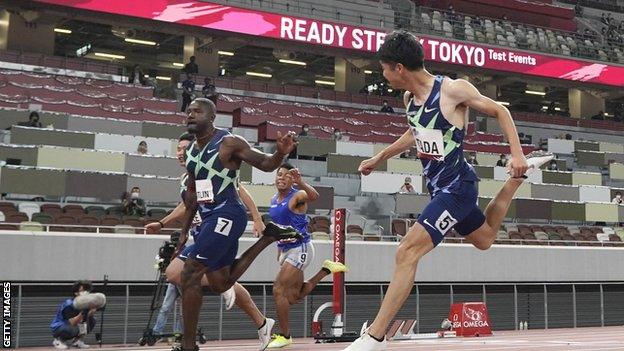Tokyo 2020: IOC 'must guarantee world-class Covid-19 protections', says World Players Association
- Published

Justin Gatlin won the men's 100m at a test event in Tokyo earlier this month
The International Olympic Committee (IOC) "must urgently guarantee world-class Covid-19 protections" if this year's Games are to be held safely, the World Players Association (WPA) says.
IOC protocols "lack the same rigour and resources" seen in professional team sports, says the WPA, which represents athletes globally.
Tokyo is set to host the Games, delayed a year by the coronavirus pandemic.
But the city is under a state of emergency because of a rise in cases.
That state of emergency is set to remain in place until the end of May, with the Olympics scheduled to start on 23 July.
Brendan Schwab, the WPA's executive director, said: "Despite having the benefit of time, knowledge and experience to prepare for this year's Olympics, it is alarming that so close to the planned opening, the IOC's measures fall so far behind the required standards.
"Given significant concerns over new and more harmful [coronavirus] variants and a vastly inconsistent global vaccine rollout, the IOC must urgently guarantee world class Covid-19 protections at the Games."
Organisers have created playbooks that lay out guidelines for the games including daily testing.
An IOC spokesman said, "We would refer you to the comments made by the Executive Director of World Health Organisation's (WHO) Health Emergencies Programme, Dr Michael Ryan, who has just recently welcomed our strict Covid-19 countermeasures.
"Acknowledging that the Games are a complex event that requires a great deal of logistics and risk management, Dr Ryan said that the WHO has "confidence that the IOC and the host city Tokyo, and the Government of Japan, will make the right decisions regarding how best to manage the risks, and are working extremely hard right now to ensure that those risks are well managed.
"We would have nothing further to add to this endorsement of our approach by the world's leading health authority."
On Wednesday, IOC president Thomas Bach said that he would ease the burden on local medical systems during the Tokyo Olympics.
He added that national Olympic committees will be asked to arrange their own medical staff where possible and that the Games will be safe for the Japanese public.
Also speaking on Wednesday, the Swedish Olympic Committee's chief executive Peter Reinebo said the Games could "become a turning point in the global pandemic".
Reinebo added: "I think that Tokyo 2020 and the IOC have done a fantastic job in creating these bubbles and the testing programme in a way that feels safe and secure."
Tokyo and several regions of Japan were under a state of emergency as a test event was staged at an empty Olympic stadium earlier this month, while a small protest took place outside, calling for the Games to be cancelled.
If people are not feeling safe, then it's a really big cause for concern - Osaka
American sprinter Justin Gatlin, the men's 100m champion in 2004, was one of 420 athletes to take part in the test event and said: "I felt beyond safe. The bubble has been very successful."
However, the United States track and field team have cancelled their pre-Olympic training camp in Japan because of concerns over the pandemic.
Japanese tennis star Naomi Osaka said last week that rising Covid-19 levels in Tokyo are a "big cause for concern" and she was "not really sure" the Olympics should go ahead this summer.
And Japan's top-ranked men's player Kei Nishikori, speaking at the Italian Open last week, said: "This is not like 100 people like [we have at] these tournaments. It's 10,000 people in an Olympic Village. With what's happening right now in Japan; it's not doing good."